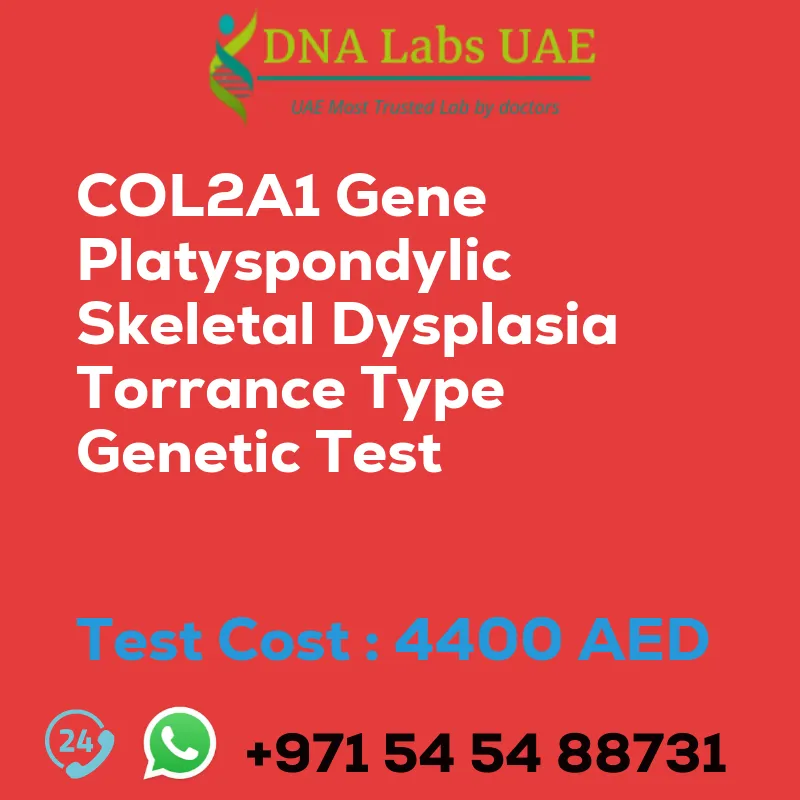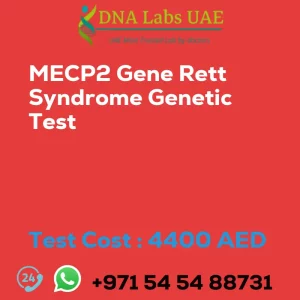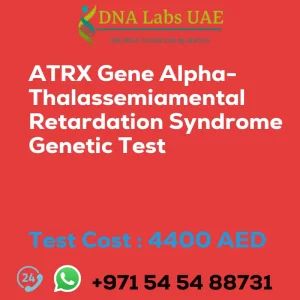COL2A1 Gene Platyspondylic Skeletal Dysplasia Torrance Type Genetic Test
Genetic Test Cost: AED 4400.0
Test Components:
- COL2A1 Gene Platyspondylic skeletal dysplasia Torrance type Genetic Test
Price: AED 4400.0
Sample Condition:
- Blood or Extracted DNA or One drop Blood on FTA Card
Report Delivery: 3 to 4 Weeks
Method: NGS Technology
Test Type: Dysmorphology
Doctor: Pediatrics
Test Department: Genetics
Pre Test Information:
Clinical History of Patient who is going for COL2A1 Gene Platyspondylic skeletal dysplasia, Torrance type NGS Genetic DNA Test. A Genetic Counselling session to draw a pedigree chart of family members affected with COL2A1 Gene Platyspondylic skeletal dysplasia, Torrance type NGS Genetic DNA Test gene COL2A1.
Test Details:
The COL2A1 gene is responsible for encoding a protein called type II collagen, which is a major component of connective tissues such as cartilage and the vitreous humor of the eye. Mutations in the COL2A1 gene can lead to various skeletal dysplasias, including platyspondylic skeletal dysplasia, Torrance type. Platyspondylic skeletal dysplasia, Torrance type is a rare genetic disorder characterized by abnormal development of the bones in the spine (vertebrae). Individuals with this condition have flattened vertebral bodies, which can cause short stature and skeletal abnormalities. Other features may include joint stiffness, cleft palate, and hearing loss.
NGS (Next-Generation Sequencing) genetic testing is a technique used to analyze multiple genes simultaneously for the presence of mutations. It allows for a more comprehensive analysis of genetic variations compared to traditional sequencing methods. In the case of platyspondylic skeletal dysplasia, Torrance type, NGS genetic testing can be used to identify mutations in the COL2A1 gene, helping to confirm a diagnosis.
Genetic testing can be beneficial for individuals with suspected genetic disorders, as it can provide a definitive diagnosis, guide treatment options, and help with family planning. It is important to consult with a healthcare professional or genetic counselor to discuss the appropriateness and implications of genetic testing in specific cases.
| Test Name | COL2A1 Gene Platyspondylic skeletal dysplasia Torrance type Genetic Test |
|---|---|
| Components | |
| Price | 4400.0 AED |
| Sample Condition | Blood or Extracted DNA or One drop Blood on FTA Card |
| Report Delivery | 3 to 4 Weeks |
| Method | NGS Technology |
| Test type | Dysmorphology |
| Doctor | Pediatrics |
| Test Department: | Genetics |
| Pre Test Information | Clinical History of Patient who is going for COL2A1 Gene Platyspondylic skeletal dysplasia, Torrance type NGS Genetic DNA Test. A Genetic Counselling session to draw a pedigree chart of family members affected with COL2A1 Gene Platyspondylic skeletal dysplasia, Torrance type NGS Genetic DNA Test gene COL2A1 |
| Test Details |
The COL2A1 gene is responsible for encoding a protein called type II collagen, which is a major component of connective tissues such as cartilage and the vitreous humor of the eye. Mutations in the COL2A1 gene can lead to various skeletal dysplasias, including platyspondylic skeletal dysplasia, Torrance type. Platyspondylic skeletal dysplasia, Torrance type is a rare genetic disorder characterized by abnormal development of the bones in the spine (vertebrae). Individuals with this condition have flattened vertebral bodies, which can cause short stature and skeletal abnormalities. Other features may include joint stiffness, cleft palate, and hearing loss. NGS (Next-Generation Sequencing) genetic testing is a technique used to analyze multiple genes simultaneously for the presence of mutations. It allows for a more comprehensive analysis of genetic variations compared to traditional sequencing methods. In the case of platyspondylic skeletal dysplasia, Torrance type, NGS genetic testing can be used to identify mutations in the COL2A1 gene, helping to confirm a diagnosis. Genetic testing can be beneficial for individuals with suspected genetic disorders, as it can provide a definitive diagnosis, guide treatment options, and help with family planning. It is important to consult with a healthcare professional or genetic counselor to discuss the appropriateness and implications of genetic testing in specific cases. |








